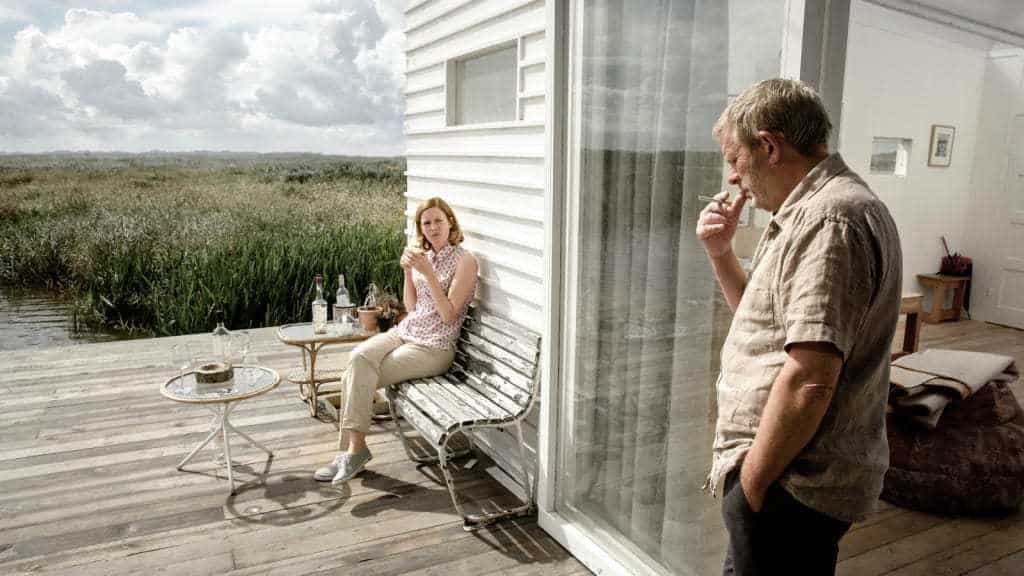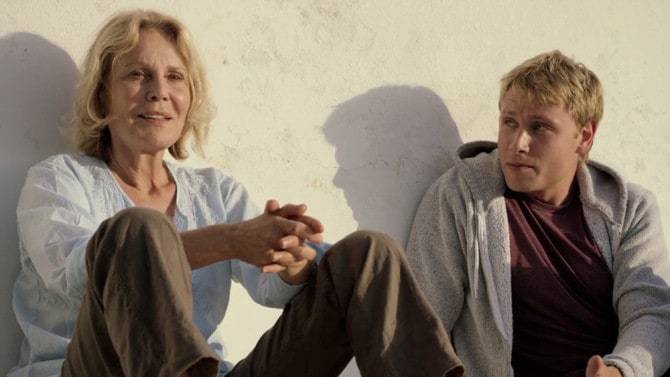In Schneider vs. Bax, the tension is always high, but there’s less of van Warmerdam’s characteristic black humour.

The world of Schneider vs. Bax is full of immaculate, white buildings with pronounced horizontal lines, and calm, beautiful landscapes with nary a soul in site. It’s the perfect ironic setting for a film that’s part thriller and part black comedy, in which two hit men are sent in each other’s way, both under false pretenses. The men are machines, or so we’re told. But on this particular sunny day, Schneider (Tom Dewispelaere) keeps getting inconvenienced with logistical problems and the elderly Bax (Alex van Warmerdam) is in the middle of a family crisis that makes him completely lose his mind.
The film opens in the morning on Schneider’s smiling family: his too-cute daughters and his stunning wife in a sundress. It’s his birthday, and while they ready for a party, he has some work to do. Waving goodbye, he heads to his drab office building for a meeting with his boss — who assigns him to kill someone. It’s hardly the result we’d expect from such a perfunctory, civilized encounter. The only explanation he’s given for why Bax needs to die immediately is that Bax is a “child killer.” Yet when we cut to Bax, he’s relaxing in a cabin by the lake, where not even a ripple disturbs the water’s calm surface. Only after his daughter arrives does Bax realise this is the day he was designated to kill Schneider — who is also supposedly a child killer. It’s rather inconvenient.
What Schneider expects to be a quick and simple job gets complicated when he’s met with a series of small complications that try his patience. Schneider discovers Bax lives next to private, protected property when Schneider is spotted by the local warden, forcing him to leave to change his disguise and car before completing the job. Back at his office, Schneider finds two trespassers whom he kidnaps out of self-preservation before using them as accomplices.
While Schneider is mired in administrivia, Bax gets a series of unexpected stressful visits. His adult daughter wants to spend quality time with him but seems depressed. He doesn’t know how to connect with her. Just as Bax discovers he needs to do a hit while indulging his daughter and keeping his profession a secret, he finds other inconvenient guests on his doorstep, including his father and his father’s twenty-year-old girlfriend.
This initial setup in the first half of the film is the best part. As complications keep arising, characters react to their situations in unexpected and humourous ways. The comedy is all in the character beats. Bax’s daughter, for example, is surprisingly comfortable with joining forces with her father to try to take out Schneider. As we put the pieces together about why the men have been sent after each other, they do too — to their mutual horror.
Writer-Director Alex van Warmerdam is extremely methodical about everything he shoots. Working in cinemascope, he borrows from the language of Westerns, but much of the film’s action is confined to the interior of the cabin. He’s constantly creating order from disorder, focussing on the white walls, the horizontal panels of the outer cabin, and the serene setting, even as we’re dealing with a life-threatening situation. Everything is shot on sticks. Rather than worrying about moving the camera constantly, van Warmerdam finds wonderful, eerie angles. The sheer width of the frame gives the film an epic feel, which helps to emphasize the absurdity of the situation, especially as Bax starts to self-medicate with all kinds of drugs in order to stay awake. In a still frame, we’re always keeping an eye out for movement, adding drama to how Schneider and Bax alternately hide in or attack from the tall grass surrounding Bax’s house.
The film runs out of steam halfway through when it shifts focus to the major confrontation between Schneider and Bax. The tension is always high, but there’s less of van Warmerdam’s characteristic black humour, in both the script and the way the formal visuals contrast with the chaos of the action, to elevate an otherwise straightforward stakeout. The mechanics of plot leave less time for casual interactions and character development, which leaves the father-daughter relationship under-explored. The premise and the ride are more exciting than the destination.
Read more: An intriguing stranger is bad news in Borgman >>

